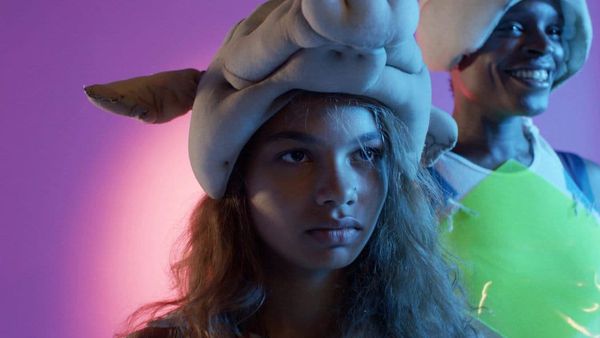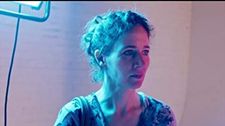 |
| Madeline’s Madeline |
Madeline’s Madeline, written and directed by Josephine Decker, is the story of a young woman with mental health problems who finds herself pushed to the edge after becoming involved with a theatre group. The powerful way that it uses imagery to get inside its heroine’s mind earned cinematographer Ashley Connor an Independent Spirit nomination. She discussed the film with me alongside other recent projects she’s been involved with, her approach to atmosphere and storytelling, and her efforts to help get more women active behind the camera.
“It was really about building up the interior world of Madeline and finding images that speak more to her emotional state than her physical one,” she says of her work on Decker’s film. “I created that sort of melted image and I’ve been developing that since college but I had never been able to work with it in a narrative film. It makes sense narratively for the story, not just like a visual trick.”
 |
| The world rushes by in Madeline’s Madeline |
It helped, she adds, that she and Decker understood each other’s working methods well.
“We’ve been collaborating for a long time... but a lot of the movie was improvised. it’s really about making the audience feel something and challenging them to feel differently about how images can affect you.”
Does it change the way she works when there are other people improvising on set?
“Yeah. At least from a lighting perspective, we have to make our lighting work to give the actors as much freedom as possible for movement. So either we would have one unit on the floor in the space and that was kind of the no-go zone, or we would set up outside and it was really just about being open to whatever the actors were wanting to do.”
She’s done a lot of work in short films and music videos. Does she feel she has more room to experiment in that situation.
“For music video work, definitely. it’s much lower stakes and it really is about creating the most out there experience that you can, so I love to do videos. I’ve always loved them... With films, though, what I appreciate about Josephine so much is that she really commits to going as crazy as we possibly can, and a lot of directors won’t go there because it’s scary. It’s scary to not see an actor constantly, it’s scary to do in-camera effects, but you know, there’s a lot of trust involved in that process.
A lot of cinemagoers judge cinematography first and foremost by its prettiness. Does she feel that there’s tension between the desire to appeal to them in that way and the desire to focus on creating atmosphere?
 |
| Under the spotlight in Madeline’s Madeline |
“I don’t like a lot of contemporary cinematography because I think it relies heavily on just creating a good looking image, and the reality is it’s very easy to create a beautiful image,” she says. “It’s much more difficult to make people feel differently.”
What’s the process through which she approaches that?
“Usually when I meet with new collaborators I immediately ask them ‘How do you visualise yourself?’ and ‘What does that mean to you?’ And then what we do next is look at the emotional context of the characters and what we’re trying to say... if I did the same thing over and over again I would be bored. Some movies and very different from others but usually it’s mainly about what the director wants.”
Have recent advancements in technology changed the way she works?
“Not really. I mean, I’m not somebody who’s into the newest tech.” She laughs. “Call me old fashioned. I’m not somebody who wants to talk with a bunch of camera dudes about some new piece of gear that everybody wants to use. But yes, I think that there have been some major developments, especially around LEDs, which have just made things so much easier for lower budget productions to get more bang for their buck. I think that there is a line that a lot of cinematographers cross now because LEDs give you such quick access to the rainbow of colours. People tend to just throw in more colours at all moments and for me I think I really have to answer questions as to why I’m doing something, not so that it looks good but why is it important to the film?”
We go on to talk about another of her recent films, The Miseducation Of Cameron Post.
“Cameron Post is a very different movie but I think it’s interesting that they kind of play off of each other because they’re two movies about teenage girls experiencing the world and how they approach that. And of course Cameron Post is very subjective film... They’re very different films but it’s really about getting to the heart of who Cameron is and what makes her who she is.”
 |
| The Miseducation Of Cameron Post |
She also worked on The Death Of Dick Long, which screened at Sundance.
“The Death of Dick Long is very different!” She laughs. “I don’t want to call it a boy movie because it’s not but it’s far more masculine than a lot of the work... We’re down south in Alabama... It was fun for me to kind of visually inhabit a different world with Daniel [Scheinert], the director, who has done some of the most popular music videos of all time. He’s very much committed to” – she hesitates – “We call it like a fun image. It was great fun to work on... People are either going to love it or hate it but it’s not a middle of the road movie.”
Only 3% of the top 100 grossing films last year had female cinematographers. Ashley has been part of a project called The Female Gaze, aimed at increasing their visibility. There was a point, she says, when people in the industry thought that it wasn’t cool to be a woman. She’s still hesitant to be “put on an island” as a female cinematographer, but says “The reality is, I still get emails constantly from young women who just don’t know any female cinematographers, or they don’t see them working, and so representation really matters.”
She’s been taking on young female camera interns to help turn things around.
“They would come to the set and ask questions but it’s really about giving them the chance to se how it works and saying ‘Ask me anything and I will help you as much as I can.’ I think young women need strong female role models to envision themselves in different positions. For me, when I finally found female DPs it was a revelation and I could finally see myself on the set. So I think it’s deeply important to still celebrate that and whilst I don’t want to be on an island I think that if there’s going to be more equality it is important to talk about the numbers and talk about how rare it is.”
Madeline’s Madeline is in UK cinemas now.





















